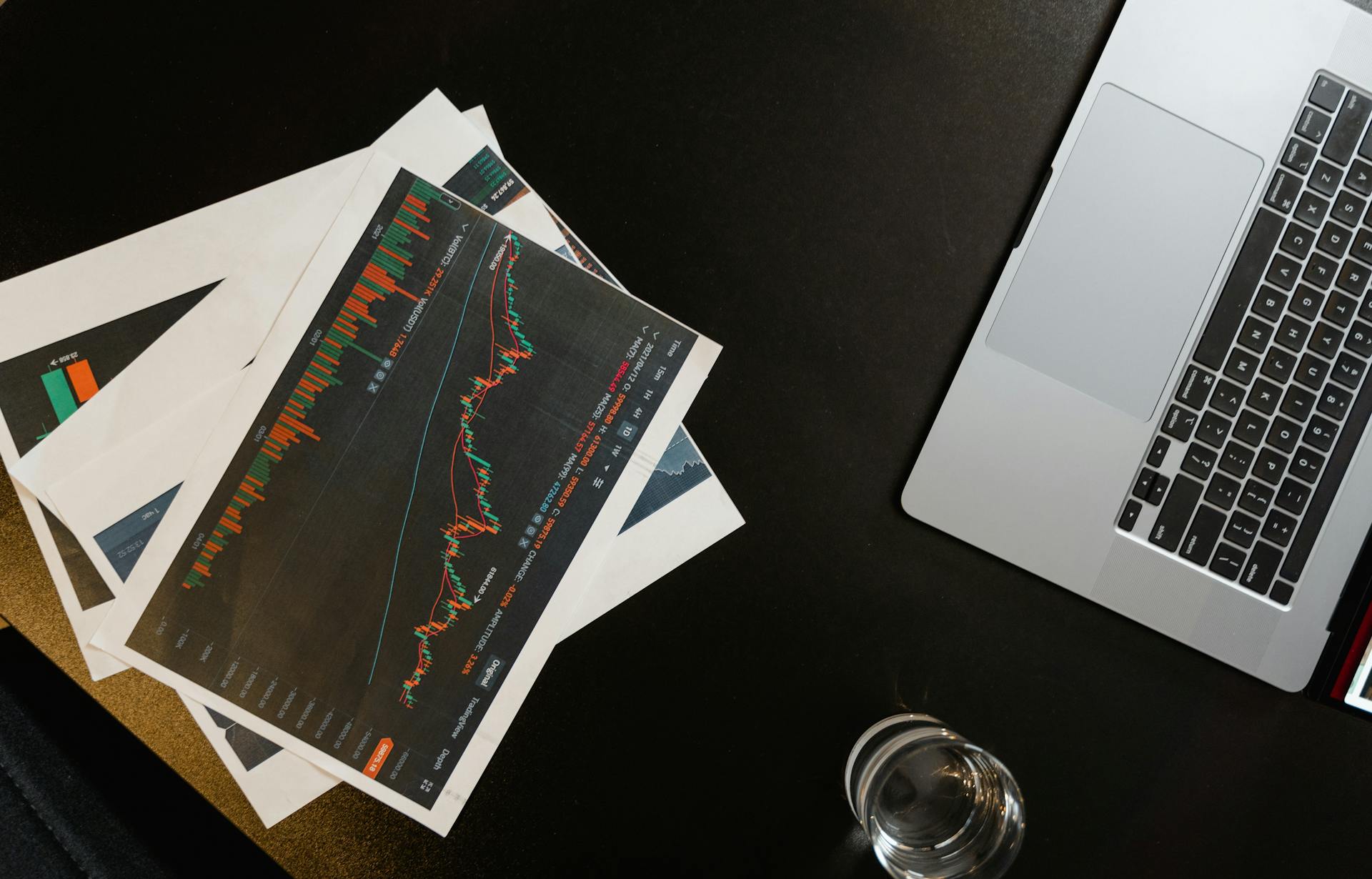
A good ESG score is a crucial factor in sustainable investing, and it's essential to understand what constitutes a good score. A good ESG score is typically above 50, with the average score being around 40.
Investors are increasingly considering ESG factors when making investment decisions, and a good ESG score can be a key differentiator. Companies with high ESG scores tend to outperform their peers in the long run.
ESG scores are often measured on a scale of 0 to 100, with higher scores indicating better ESG practices. A score above 70 is generally considered excellent, while a score below 30 is considered poor.
What is an ESG Score?
An ESG score is a numerical representation of a company's performance in managing its environment, social, and governance risks relative to its peers.
A good ESG rating means a company is managing its environment, social, and governance risks well, while a poor ESG rating indicates relatively higher unmanaged exposure to ESG risks.

The MSCI ESG score is one of the most widely referenced ESG rating systems, scoring roughly 8,500 companies and more than 680,000 fixed-income and equity securities globally, including ESG funds.
The foundation of the MSCI ESG score is a key issues framework that measures risk across 10 categories of environment, social, and governance areas.
How ESG Scores are Calculated
ESG scores are calculated through a multi-step process. The first step is data collection, which involves gathering as much information as possible about an organization's ESG efforts, including data from publicly available sources, media reports, and academic research.
The data is often assembled with the guidance of an ESG reporting framework, such as the GRI or TCFD. Interviews and analysis with the company being scored can also be included. Cloud software providers offer ESG tools to facilitate large enterprises' ESG efforts.
The data is then analyzed to assign weights or values to each entry. For example, MSCI assigns a score from 0 to 10 based on an issue's timeliness and probable impact. The weights assigned to each issue are based on their potential impact within a two-year timeline, with higher weights assigned to issues with a greater potential for impact.
Here's a breakdown of the 10 categories of environment, social, and governance areas measured by the MSCI ESG score:
- Environment: climate change, water, pollution, etc.
- Social: human rights, labor practices, community relations, etc.
- Governance: board composition, executive pay, audit committee, etc.
How ESG Scores are Calculated
ESG scores are calculated by measuring a company's performance across three pillars: Environmental, Social, and Governance (ESG). These pillars are the foundation of the MSCI ESG score, which is one of the most widely referenced ESG rating systems.
The MSCI ESG score is based on a key issues framework that measures risk across 10 categories of environment, social, and governance areas. This framework helps investors understand a company's priorities and long-term risks.
The Environmental pillar assesses a company's waste management and pollution mitigation efforts, energy efficiency, carbon emissions, water consumption, and climate change initiatives. It's like taking a snapshot of a company's environmental impact.
The Social pillar evaluates factors such as health and safety protocols, human rights, fair labor practices, workforce diversity, and relationships with surrounding communities. This helps investors understand how a company treats its employees and the communities it operates in.
The Governance pillar looks at a company's corporate structure, assessing board member representation, fair compensation, business and financial ethics, and risk management practices. It's like checking a company's internal controls.
Expand your knowledge: How to Find a Company's Esg Score

The Governance pillar is broken down into two categories: corporate governance and corporate behavior. Corporate governance includes the composition of the board, executive compensation, ownership, and accounting practices. Corporate behavior encompasses other governance-related factors.
Here are the 10 categories of environment, social, and governance areas that the MSCI ESG score measures:
- Environment: waste management, pollution mitigation, energy efficiency, carbon emissions, water consumption, climate change initiatives
- Social: health and safety protocols, human rights, fair labor practices, workforce diversity, relationships with surrounding communities
- Governance: board member representation, fair compensation, business and financial ethics, risk management practices
These categories are used to calculate the MSCI ESG score, which helps investors make informed decisions about their investments.
Data Collection
Data collection is a crucial step in calculating ESG scores. It involves gathering information about an organization's ESG efforts, including environmental, social, and governance practices.
This data can come from publicly available sources, such as ESG reports, media reports, and academic research. Cloud software providers offer ESG tools to facilitate large enterprises' ESG efforts.
ESG reporting frameworks like the GRI or TCFD often guide the data collection process. These frameworks help ensure that the data collected is comprehensive and comparable.

Data is often assembled with the help of an ESG reporting framework. This helps ensure that the data collected is relevant and accurate.
In addition to publicly available sources, data can also come from interviews and analysis done directly with the company being scored. This can provide valuable insights into the company's ESG practices.
Here are some common data sources used in ESG scoring:
- Company 10-Ks
- Sustainability reports
- Proxy reports
- Thousands of monitored media outlets
- Data from governments, regulatory organizations, and NGOs
Assigning Weights
Assigning weights is a crucial step in calculating ESG scores. This involves assigning a value to each entry based on its potential impact.
An ESG rating agency might use several data points related to ESG issues. For example, MSCI assigns a score from 0 to 10 based on an issue's timeliness and probable impact.
The weights assigned to each issue are based on their potential impact within a two-year timeline. Higher weights are assigned to issues with a greater potential for impact, making them more significant in the scoring process.
A fresh viewpoint: Top-rated Impact Investing Platforms
Why Are They Important?

A good ESG score is crucial for companies to manage their environment, social, and governance risks effectively.
Companies with good ESG scores can validate their ESG-related efforts, providing a publicly disclosed metric based on their initiatives. This helps them measure progress and identify areas of potential concern and risk from an ESG perspective.
An ESG score is a way for companies to compare themselves to their peers and industry benchmarks. This allows them to understand how they stack up and where they need to improve.
The MSCI ESG score is one of the most widely referenced ESG rating systems, scoring roughly 8,500 companies and more than 680,000 fixed-income and equity securities globally.
Here are some reasons why ESG scores are important to companies:
- Validation: ESG scores provide a way for an organization to validate its ESG-related efforts.
- Peer comparison: ESG scores let organizations and their investors compare one company against another.
- Benchmarking: ESG scores enable broader industry benchmarking to understand how a specific industry vertical scores and where different companies fall within the results.
- Managing progress: With an ESG score in hand, a company can better manage and measure progress using a quantitative metric.
- Investor attraction: An ESG score provides investors with an attribute that can help them make ethical, sustainable investing decisions.
- Risk management: An ESG score can help identify areas of potential concern and risk from an ESG perspective.
Socially conscious investors will want to build an investment strategy that aligns with their values, and a good ESG score can help them make informed decisions.
Using ESG Scores in Investing

A good ESG score can help you identify companies with strong environmental, social, and governance practices. This can lead to lower-risk, higher-return investments.
The MSCI ESG score is one of the most widely referenced ESG rating systems, covering roughly 8,500 companies and more than 680,000 fixed-income and equity securities globally.
Investors use ESG scores to make informed decisions, such as identifying companies with sustainable business practices and delivering outstanding financial returns.
Here are some ways ESG scores are used in the market:
- Capital allocation decisions, like investments or assessing credit risk
- Human capital management and staffing decisions
- Identifying top or bottom performers on environmental issues, like carbon emissions or water management
- Assessing corporate performance on stakeholder issues, like employee value or community impact
Just Capital is a popular NGO scoring system that assesses corporate performance on stakeholder issues. CDP (The Carbon Disclosure Project) is another NGO scoring system that evaluates corporate performance on environmental issues.
ESG scores can be used for various purposes, such as regulatory disclosures, reporting to clients and stakeholders, and demonstrating ESG transparency and leadership.
ESG Scores and Sustainability
A good ESG score means a company is managing its environment, social, and governance risks well relative to its peers.

Companies with strong MSCI ESG Ratings profiles may be better positioned for future challenges and experience fewer instances of bribery, corruption, and fraud.
The MSCI ESG score is a widely referenced rating system that scores roughly 8,500 companies and more than 680,000 fixed-income and equity securities globally, including ESG funds.
A good ESG rating is based on a key issues framework that measures risk across 10 categories of environment, social, and governance areas.
Here are some key ESG issues to consider:
- Climate change: carbon emissions, product carbon footprint, financing environmental impact, and climate change vulnerability.
- Natural capital: water stress, biodiversity and land use, and raw material sourcing.
- Pollution and waste: toxic emissions and waste, packaging material and waste, and electronic waste.
- Environmental opportunities: clean technology, green building, and renewable energy.
The MSCI ESG score is a valuable tool for investors to understand a company's priorities and the long-term risks it could face in the future.
Understanding ESG Ratings Platforms
ESG ratings platforms are crucial in evaluating a company's performance on environmental, social, and governance (ESG) factors. They provide a framework for assessing a company's sustainability efforts and comparing them to industry peers.
There are several ESG ratings platforms, including MSCI, Sustainalytics, and S&P Global, which use various methodologies to assign scores to companies. MSCI, for example, uses a rules-based methodology to identify industry leaders and laggards according to their exposure to ESG risks and opportunities.
Recommended read: Esg Ratings Agencies
These platforms are used by external stakeholders, such as institutional investors and rating agencies, to review company disclosures and conduct primary research to assign ESG scores. ISS, for instance, has a variety of scoring systems, including issue-specific scores and category-specific measures.
ESG scores are often used to inform capital allocation decisions and are a key factor in evaluating a company's sustainability performance. Companies with high ESG scores are generally considered to be better performers in the market.
Here's a summary of the ESG ratings platforms mentioned in the article:
- MSCI: uses a rules-based methodology to assign ESG ratings
- Sustainalytics: offers ESG risk ratings for over 16,000 companies
- S&P Global: provides ESG scores for over 11,000 companies
- ISS: has various scoring systems, including issue-specific scores and category-specific measures
These platforms provide a valuable tool for investors and stakeholders to evaluate a company's sustainability performance and make informed decisions.
Getting Started with ESG Scores
A good ESG rating means a company is managing its environment, social, and governance risks well relative to its peers.
The MSCI ESG score is one of the most widely referenced ESG rating systems, scoring roughly 8,500 companies and more than 680,000 fixed-income and equity securities globally, including ESG funds.
The foundation of the MSCI ESG score is a key issues framework that measures risk across 10 categories of environment, social, and governance areas.
Understanding ESG ratings can help investors grasp a company's priorities and the long-term risks it could face in the future, along with ESG reporting.
Frequently Asked Questions
What is an average ESG score?
There is no average ESG score, as scores vary widely across reporting organizations. However, a score above 70 is generally considered good, while scores below 50 are considered poor.
Sources
- https://www.msci.com/sustainable-investing/esg-ratings
- https://trellis.net/article/esg-score-calculation-how-find-your-companys-rating-part-1/
- https://www.fool.com/terms/e/esg-rating/
- https://corporatefinanceinstitute.com/resources/esg/esg-score/
- https://www.techtarget.com/sustainability/definition/ESG-score
Featured Images: pexels.com
